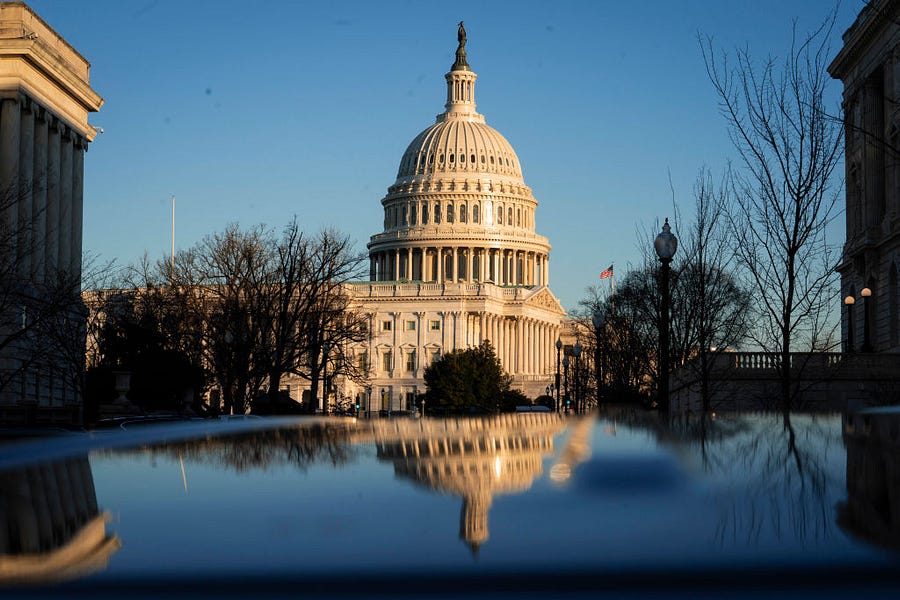The frenzied response to the leak of Supreme Court Justice Samuel Alito’s draft opinion that would repeal Roe v. Wade has once again highlighted America’s extreme polarization, which has, in part, been driven by an ever increasing tendency to nationalize political disagreements. A turn away from this modern obsession with one-size-fits-all federal policy and back to more localized politics may help alleviate some of this national angst.
One potential—albeit maybe slightly madcap and certainly longshot—approach is to consider a repeal of the 17th Amendment, an argument last earnestly considered by the Tea Party more than a decade ago. For those who have misplaced their pocket Constitutions, the 17th Amendment, which was ratified in 1913, reworked Article 1 of the Constitution by stipulating that U.S. senators are to be “elected by the people” rather than “chosen by the [state] Legislature.” While acknowledging that any change to the constitution seems far-fetched at this moment, it is nonetheless useful to consider how repealing the 17th Amendment could improve the state of our politics and discourse.
While the federalism argument advocated by the Tea Party still holds, it can now be supplemented with a more novel view that the 17th Amendment contributed to a reorientation of the Senate in a national manner by misdirecting senators’ focuses and warping the incentives they face. In turn, these dynamics are exceedingly fueling polarization and yielding dysfunction in Washington, D.C. Repeal may, consequently, contribute toward a reduction of this national polarization by refocusing some political energies inward.
Although the federalism and polarization arguments are related, they emphasize different things. The traditional federalism argument tends to focus on who wields policymaking power—with a preference toward the most local level of government competent enough to address an issue. It rightly contends that a return to the status quo ex ante would have the potential to increase local control and reign in the excesses of the federal government. The original purpose of the Senate was to speak for state interests, an unambiguous contrast to the House, which represents the interests of the people. This argument was made explicit in Federalist 62: “It is recommended by the … advantage … of giving to the State governments such an agency in the formation of the federal government as must secure the authority of the former, and may form a convenient link between the two systems.”
The 17th Amendment undoubtedly undermined the centrality of the states’ roles in the national framework and predictably failed its progressive patrons’ purported objective of eliminating the corruption that, in their view, was germane to the original formulation of the Senate.
But, it also had the often overlooked effect of creating a new system that was ripe for the more destructive aspects of populist democracy—a cost that America is resoundingly bearing more than a century later. In practice, the 17th Amendment did not merely change who selects senators, but distorted the incentive structure faced by politicians and ultimately reordered which individuals and groups are a senator’s effective constituents.
Contrary to the vision of the founders, U.S. senators today have broad national platforms—a primary source of the Senate’s increasing dysfunction. As Yuval Levin has eloquently argued, senators spend much of their time performing, rather than legislating. In part this is due to the national incentive structure in which they find themselves, a combination of external pressures and powerful stakeholders that do not align with the state interests that senators are supposed to represent.
These national pressures are manifold and have both a centralizing and conforming impact on senators. The demand on senators to conform to extreme national partisan positions is one of the rare features of D.C. that is bipartisan, and has undermined the Senate’s capacity for any meaningful work.
A prime example of such national forces is the national media, including social media and the Twitter-verse, which has all but abolished local media and its parochial interests. The elevation of the national media has had the dual effect of reducing or eliminating a major channel to funnel or express local concerns and, simultaneously, diverting senators’ eyes toward large uniform outlets. Senators are thus hearing less from locals and speaking more to a perceived monolithic national audience.
National parties have played a similar role. While the institutional power of national parties has waned—and is quite possibly at a historical low—they have a wide and influential platform that applies considerable pressure for conformity. No longer are they big tents trying to negotiate a political compromise, but rather one-size-fits all special interests that are more adept, like many of our institutions in the digital age, at ostracizing and shaming. To be tarred and feathered as an outsider to the party, a RINO or a traitor, can be fatal to all but the most stalwart politicians. Even if not politically lethal, pushing back against such pressures exacts high costs, draining considerable political capital.
Likewise, senators are increasingly focused on a national campaign financing process, rife with special interests, national parties and the media; all of which are encouraging polarization and dysfunction. Large national special interests are often better funded and connected and can more effectively and efficiently leverage their heft than the smaller parochial interests that are being crowded out.
While senators essentially swim in the combined national seas of media, party, and donor, their direct election under the 17th Amendment has also altered the bases to which they speak in elections. Common wisdom holds that primaries—through which most senatorial candidates are selected—tend to encourage extremism. While the research is mixed on whether primary voters are actually closer to the fringes of their respective parties, and successful primaries of incumbent senators are extremely rare, senators undeniably modify their positions and presentations to speak to such an audience. Indeed, candidate behavior and promises may very well cater to the perceived national base in a way that drives platforms and ultimately policies to the extremes.
The travails of Senators Joe Manchin (D-WV) and Kyrsten Sinema (D-AZ), who have been ostracized for failing to toe the national party line when they support the substantially divergent views of their respective states, highlight these enormous national pressures. Most sitting senators do not have the backbones of these two, which is why good legislators, such as Richard Burr (R-North Carolina), Pat Toomey (R-Pennsylvania) and Rob Portman (R-Ohio), are opting to retire and potential new talent, including Govs. Chris Sununu (R-New Hampshire) and Larry Hogan (a Republican with a whopping 70 percent approval rating in deep blue Maryland), are avoiding the Capitol at all costs.
The repeal of the 17th Amendment would reduce or eliminate the impact of these national pressures, which may consequently help dampen growing political polarization in this country. Senatorial primaries will immediately disappear and special interests will lose access and influence wielded through campaign contributions. National parties and media will undeniably have less sway over senators. To be clear, national pressures will not disappear—certainly not overnight—but they will simultaneously command less senatorial attention and hold reduced influence over senators’ behaviors.
Such a move would help realign the system, first by placing another level between these populist forces and the halls of power. State legislators will serve as a mediating level between national pressures and senators. The influence and power of national special interests, media and donor dollars will necessarily become less concentrated, as they will have to ply their pressures on 7,383 state legislators instead of 100 senators.
Concomitantly, repeal of the 17th Amendment would insulate senators from the masses. Such reduction in democracy is a feature, not a bug, of the reform, particularly given the vitriolic populist age that we find ourselves in, and better aligns the Senate with its original purpose.
However, senators would not become unaccountable to the people, especially given the power that the digital age has given the citizen journalist. State legislators would remain directly answerable through popular elections and would, as intermediaries, ultimately bear responsibility for senators. Furthermore, the US House of Representatives would continue its function representing the public, serving as a popular check on states.
Of course, this does not imply that a return to the pre-17th Amendment model would remove external pressures. It is the explicit aim of representative democracy that elected leaders are to embody, in part, the desires of their constituents and to reflect the needs of those who will be affected by the policies they implement. Pressure on politicians is germane to the system. However, it is preferable that those pressures and the incentive structures in which they operate are aligned in a way that is healthiest for our republic. For instance, the click-bait needs of 24-hour national media and the online Twitter mobs are less essential than that of American citizens who need focused and functioning governments at all levels of our federal system.
The flip side of relieving national pressures is that it will free senators to articulate local concerns on behalf of state residents, without the distraction of national interests. It will considerably raise the importance of state legislators as the key constituents for senators. State legislators, who each speak for a smaller number of state residents, can better channel local interests and are generally more detached from national politics.
Critics may contend that rather than localizing politics, repeal will nationalize local politics. State legislators may continue to look to national markets and pressures—at least until the dynamic changes—and national special interests may corrupt local interests. State policies, such as gerrymandering, may become even more contentious as the stakes of local races rise.
While there is undeniably some truth to these concerns—local politics are increasingly becoming nationalized and there is no fully stuffing the genie back in the bottle—the proposed change cannot be worse than the status quo. Furthermore, these challenges may be offset by increasing the importance of local elections. Voter interest in local elections is abysmally low. Turnout in municipal elections is frequently less than half of that in presidential elections. Such voter apathy has led to general inattention, if not neglect, of the very real (albeit often humdrum) issues, such as zoning and education, that most frequently and directly impact residents’ lives.
In a higher stake environment, more residents will have an interest in getting involved—at first maybe merely to ensure they control their representation in the U.S. Senate, but eventually to direct their energies at managing local concerns. Moreover, given the smaller size of their respective districts, voter action and votes will actually matter more, precisely at the level of government closest to their daily lives.
If individuals turn the focus locally they will not only arrive at policy solutions more appropriate to their immediate needs, but they may help calm national tempers by reducing the desire to control the policies and behaviors of people in neighboring states. Senators can then serve a more appropriate and originalist role of advocating for their respective states’ preferences in policy areas that can only be managed at the federal level.
Of course this proposal is not a panacea. Drastic changes to our constitutional system should be made with caution. Unforeseen consequences are undoubtedly lurking around the corner. Additionally, such a change to the nature of the federal government cannot be made in isolation. Other tools should be deployed that both strengthen federalism and diminish pernicious populism and polarization. Nonetheless, a turn inward to the state, an encouragement for everyone to tend their own gardens, rather than agitating for change across the country, would temper the totalizing impulse of the modern age and contribute to a much needed calming of national politics.
Joshua Grundleger is an economist and political analyst based in the New York area. The views expressed are the author’s own and do not reflect those of any affiliated organizations.







Please note that we at The Dispatch hold ourselves, our work, and our commenters to a higher standard than other places on the internet. We welcome comments that foster genuine debate or discussion—including comments critical of us or our work—but responses that include ad hominem attacks on fellow Dispatch members or are intended to stoke fear and anger may be moderated.
With your membership, you only have the ability to comment on The Morning Dispatch articles. Consider upgrading to join the conversation everywhere.